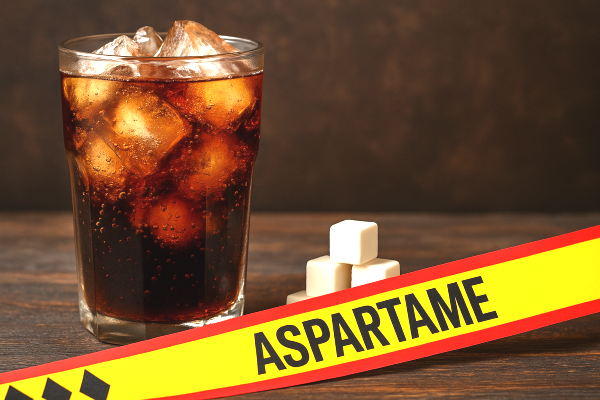Let’s not beat around the bush: Aspartame, a.k.a. NutraSweet®, Equal®, Spoonful®, or E951, is a sweet-tasting chemical weapon hiding in your soda, gum, and low-calorie snacks. While they market it as a “safe” sugar substitute, its history and toxic effects tell a different story, a story drenched in deceit, neurological disease, and corporate corruption. They will do anything for a buck (in reality, slow poison) and call it an “upgrade.”
In 2000, Nancy Markle blew the lid off this poison at the World Environmental Conference. She spoke of how diseases like Multiple Sclerosis, Lupus, Hepatitis, and Diabetes were suddenly skyrocketing, and no one could figure out why. Nancy explained: when Aspartame is heated beyond 86°F, as happens in cars, warehouses, and sunny convenience store shelves, it breaks down into methanol, which is then converted in your body into formaldehyde and formic acid, the same toxic category as cyanide and arsenic.
No wonder people are getting sick.
Neurological Carnage and the MS-Lupus Connection
Markle reported countless cases of people misdiagnosed with Multiple Sclerosis when they were actually suffering from methanol toxicity. Pull them off Aspartame, and many recovered. But Lupus, aggravated by daily Diet Coke and Diet Pepsi binges, could become so severe it turned life-threatening. The victims’ vision, hearing, and nervous system all took a hit. Even Tinnitus and other nerve-related disorders reversed when Aspartame was removed from the diet.
And in the retina of your eye? That same formaldehyde sets up shop, slowly eroding your sight.
Modern Science Now Catches Up with What They’ve Been Hiding
Fast-forward to 2023–2025, and finally, some major global health bodies and cutting-edge studies are saying what whistleblowers like Markle and neurosurgeons like Dr. Russell Blaylock have been warning about for decades:
- In July 2023, the World Health Organization’s IARC classified Aspartame as “possibly carcinogenic to humans” (Group 2B), citing its link to liver cancer.
- A 2025 molecular docking study found that Aspartame binds to CASP1 proteins, which may ignite cancer-causing inflammation in the liver.
- New research from 2025 uncovered how Aspartame metabolites damage the blood–brain barrier, opening the door to stroke, dementia, and neurodegeneration.
- A French cohort study of over 100,000 people linked Aspartame intake to a 15% higher overall cancer risk.
- Even more frightening, diet soda drinkers showed up to a 3X greater risk of dementia, according to cognitive function studies in 2025.
So if your brain feels foggy and your body’s aching, it’s not just age, it’s chemical warfare from your favorite “diet” products.
Aspartame: A Weight-Loss Lie That Makes You Fat
They sell it as a diet product, but the joke’s on you. According to Dr. H.J. Roberts, diabetics who quit Aspartame dropped an average of 19 pounds (8½ kg). Why? Because Aspartame triggers carb cravings, stores formaldehyde in fat cells (hello, hips and thighs), and blows your blood sugar to smithereens.
Even the New York Times warned in 1996 that the American Diabetes Association, funded by Monsanto, the makers of Aspartame, was too cozy with food industry giants to warn the public. Nearly 30 years later, nothing’s changed except that more people are sick.
Heart Attacks, Strokes, and Desert Storm Disease
A 2025 Swedish study revealed that Aspartame contributes to arterial plaque, high insulin spikes, and heart inflammation, hallmarks of heart attacks and strokes. And remember the Gulf War mystery illnesses? Thousands of pallets of diet sodas are baked in the Saudi sun, converting Aspartame into methanol poison. Soldiers drank it for months. They came home with chronic fatigue, joint pain, and neurological chaos. Sound familiar?
Destroying the Youngest and the Weakest
Dr. Roberts warns that drinking Aspartame during pregnancy concentrates toxic phenylalanine in the placenta, raising the risk of birth defects and mental retardation. Neurosurgeons have even reported finding high levels of Aspartame residues in brain tumors.
And now, Alzheimer’s disease, once a disease of the elderly, is striking people as young as 30 years old, some of whom were lifelong diet soda addicts. Coincidence? Hardly.
Symptoms of Aspartame Poisoning: Are You Next?
If you use a lot of “sugar-free” gum, diet sodas, flavored waters, or protein powders, beware. You may already be experiencing:
- Fibromyalgia
- Muscle spasms and shooting pains
- Numbness in your limbs
- Migraines, vertigo, and dizziness
- Joint pain and inflammation
- Depression, anxiety, panic attacks
- Blurred vision, tinnitus, slurred speech
- Seizures, memory loss
- Sudden weight gain despite dieting
Your body is trying to tell you something. Listen. Stop consuming it.
Environmental Destruction Too
The environmental nightmare doesn’t stop with your body. Aspartame and other artificial sweeteners are now polluting rivers and lakes, where they harm aquatic life and contaminate drinking water. It’s not just a human health crisis, it’s an ecological one.
Follow the Money, Ignore the Warnings
Monsanto, Coca-Cola, and PepsiCo rake in billions while regulators play blind. Despite the warnings, aspartame remains in over 5,000 products worldwide, across 90 countries. Why? Because addiction, illness, and death are big business. And your suffering fuels their stock prices.
What to Do
If you’re still drinking diet soda or chewing that sugar-free gum, it’s time to wake up. You wouldn’t swallow formaldehyde, methanol, or arsenic straight from a lab bottle, so why are you paying to ingest it in your so-called “health foods”?
Your body deserves better. Switch to:
- Stevia
- Monk Fruit
- Raw honey
- Clean water
Throw that chemical garbage in the trash where it belongs.
References:
- WHO. “Aspartame classified as a possible human carcinogen.” 2023.
- Monte WC. “Aspartame, Methanol, and Public Health.” J Appl Nutr. 1984.
- Roberts HJ. Aspartame Disease: An Ignored Epidemic. 2001.
- Blaylock RL. Excitotoxins: The Taste That Kills. 1994.
- Trocho C. et al. “Formaldehyde from Aspartame binds to tissue components.” Life Sciences, 1998.
- French NutriNet-Santé Cohort, 2024.
- Nature Scientific Reports, July 2025.
- Cell Metabolism, 2025.
- New York Times, Nov. 15, 1996.
- Health.com, 2025.
